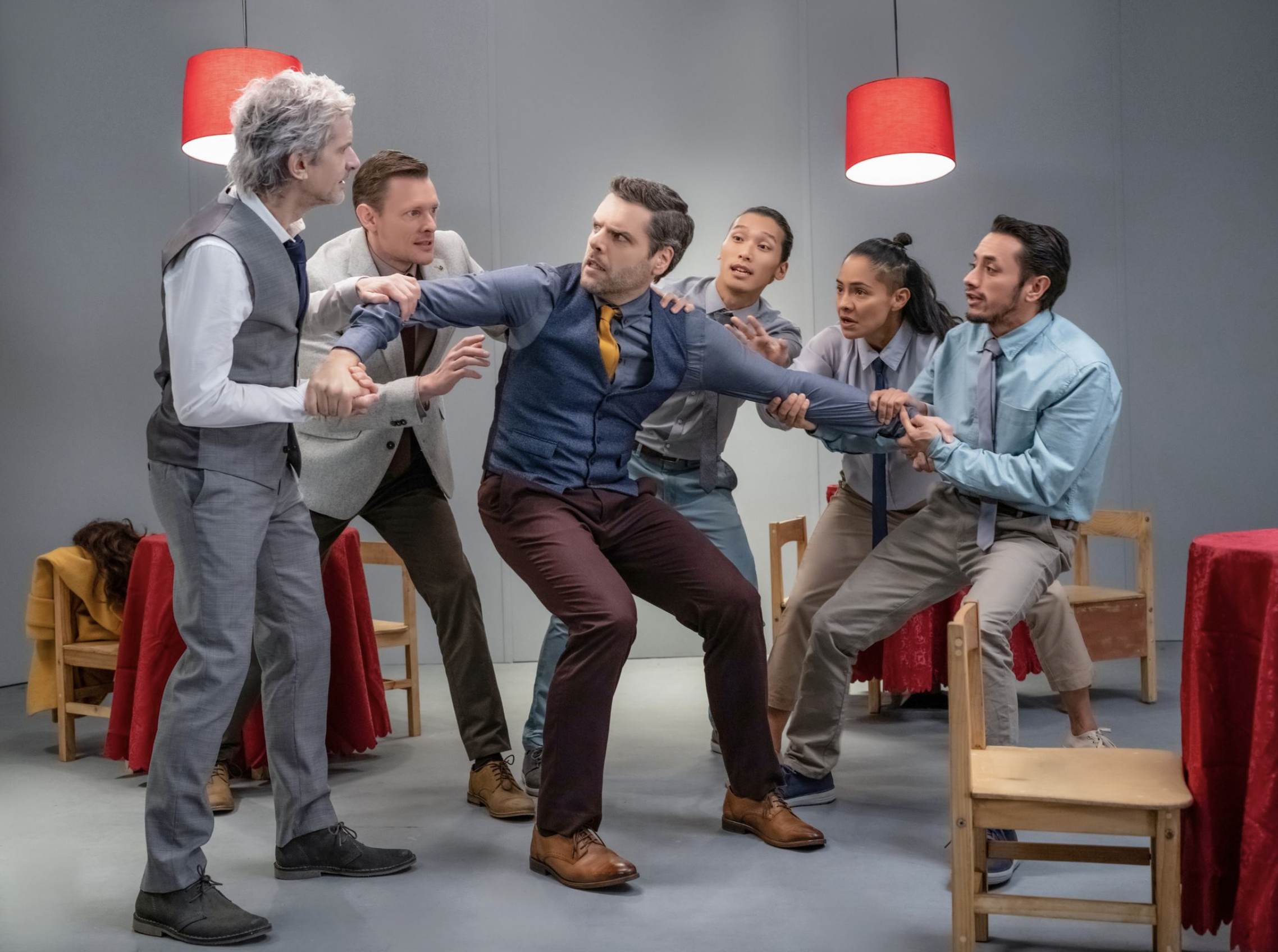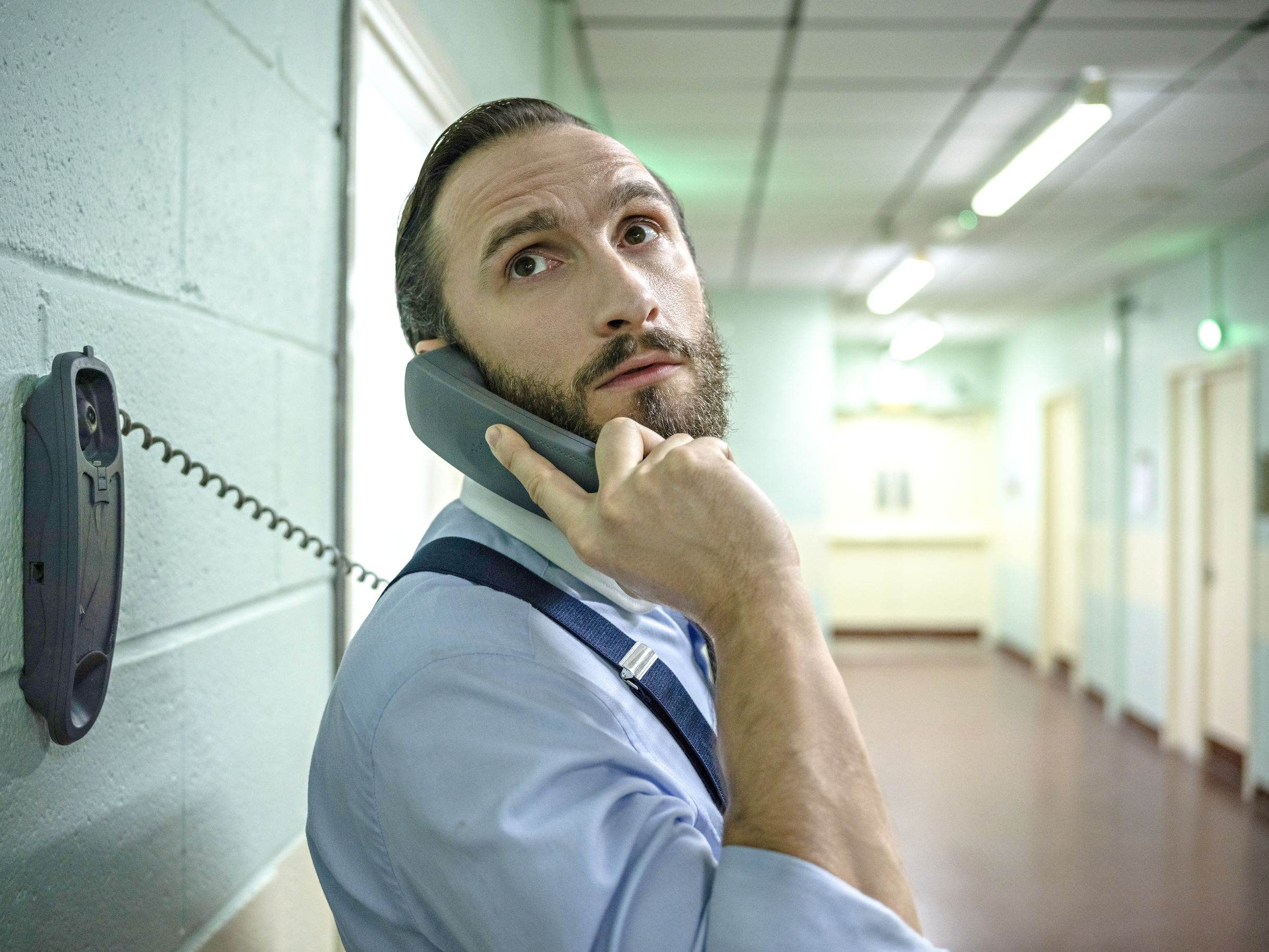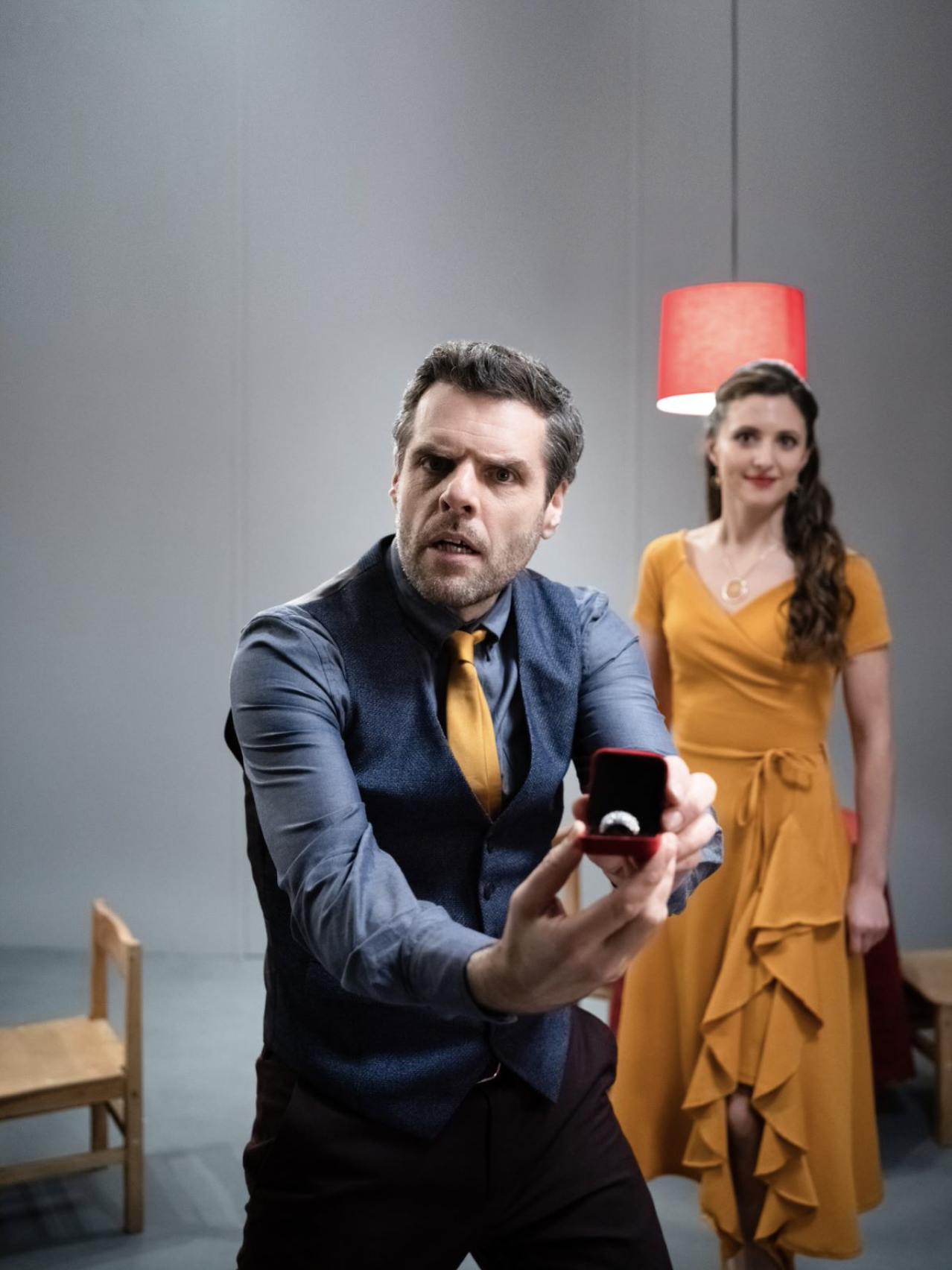
Institute
In collaboration with Illuminations, The Space and BBC, Gecko presents its debut feature film Institute, an intimate, funny and moving exploration of what it means to care.
Based on our internationally acclaimed stage production and drawing on our reputation for generating unique worlds, intoxicatingly beautiful scenes and breath-taking choreography, this new film is a visually captivating and poetic dissection of the way we nurture and care for ourselves and each other.
In a time when we are potentially more fractured and disconnected than ever before, Institute asks how we care more for each other in the fast-paced, target-driven machinery of modern life? Who will be there to catch us when we fall?
Set in a shadowy establishment where residents attempt to create order from the chaos of life, carers become patients, memories fracture and relationships collide.
★★★★ The Reviews Hub
★★★★ Theatre Weekly
Critics’ Choice in The Sunday Times
“Adversity can be a chance to lift yourself to somewhere remarkable”. Read Amit’s interview in The Stage.
Premiered on Sunday, 19 July 2020 on BBC Four.
Upcoming Screenings
There aren’t any upcoming screenings of Institute for the time being, watch this space for updates.
















“Every moments of Institute feels carefully and deliberately choreographed, mixing scenes of dramatic interaction with dance, movement and even hints of clowning… However you choose to interpret what is happening to Daniel and Martin, the storytelling is engaging, while the expressiveness of the various scenarios draws the viewer in.” ★★★★
Maryam Philpott, The Reviews Hub
-
Directed and Performed by Amit Lahav
With Performers:
Daniel Chris Evans
Karl Ryen Perkins Gangnes
Louis François Testory
Louisa Vanessa Guevara Flores
Hernando Miguel Hernando Torres Umba
Margaret Katie Lusby
Ghost David Meyer
Poon Kenny Wing Tao HoDirector of Photography: Emma Dalesman
First Assistant Camera: Claire Fraser
Second Assistant Camera: Tom Carpenter
Gaffer: Ben Starkin
Best Boy: Joe Nowell
Electrician: Camil Liberto
Grip: Rogan Brown
CRT Monitor Playback: Jim HorsfieldProduction Designer: Eileen Aldous
Art Director: Stuart Brindle
Art Department: Jonathan Atkinson, Andy Pearson, Dethan Atkinson, Martin Berry
Original Stage Design: Rhys Jarman
Costume: Gayle Playford
Makeup and Hair: Hattie LevistonProduction Manager: Sean Ford
Production Co-ordinators: Francesca Bloor, Genine Sumner
First Assistant Director: Ian Astridge
Script Supervisor: Juley Harding
Stunt Co-ordinator: Stewart James
Production Team: Steve Allman, Joe Salkey, Matilda Wilde, Angus WilliamsFilmed on location at Bentwaters Parks
Original Music Composed and Performed by Dave Price
Bass Clarinet: James Alsopp
Sound Supervisor: Andy Rose
Sound: Paul Barton, Alison Dale
Una notte a Napoli: Music and lyrics by Thomas M. Lauderdale, China Forbes, Johnny Dynell and Alba Clemente, from the Pink Martini album “Hang on Little Tomato”, courtesy of Heinz RecordsEditor: Todd MacDonald
Visual Effects: Andy Quinn
Colourist: Final Frame
Post Production Facilities: Storm HD
Title Design: The PanicsWith special thanks to: Andy Brumwell, Coes of Ipswich, Screen Suffolk
Executive Producer for The Space: Fiona Morris
Executive Producer for the BBC: Emma Cahusac
Producers: Rosalind Wynn, John Wyver -
Included as part of the Official Selection for Le Festival International du Film sur l'Art, 2021.
Winner of OneDance UK’s Award for Dance on Film 2021.
Featured in The Times Viewing Guide and as Critics’ Choice in The Sunday Times.
“Every moments of Institute feels carefully and deliberately choreographed, mixing scenes of dramatic interaction with dance, movement and even hints of clowning… However you choose to interpret what is happening to Daniel and Martin, the storytelling is engaging, while the expressiveness of the various scenarios draws the viewer in.” ★★★★ Maryam Philpott, The Reviews Hub
“Institute poses plenty of questions, but suggests no answers. It is an excellent example of the physical theatre that has made Gecko renowned in the field, while its cryptic narrative displays ambition and thoughtfulness.” ★★★★ Greg Stewart, Theatre Weekly
“One of the more striking aspects about the production is that the theatrical origins do not limit transition to the screen… Institute is such a successful TV presentation it becomes hard to imagine if it would have worked so well on stage.” David Cunningham, British Theatre Guide
-
We sat down with director and creator of Institute the show and the film, Amit Lahav, to ask him about the process of adapting the piece from stage to screen.
What originally prompted you to create a theatre piece around care and mental health?
Sometimes it’s a deep-seated feeling, rather than a theme. Having witnessed and seen some of the painful flip-side of people not caring for each other, I started thinking about how we could be better at caring for one another. The stress of running a company, the stress that I see in so many people around me, and the pressure that modern life puts on you that precludes you from connecting with people emotionally, on a human level. I think those were the sorts of things that I was focused on during that time – seeing it in everyday life, seeing it on a societal, global scale, and seeing it close to home. But I also saw the other side of care and caring, how extraordinary people are, and what extraordinary capacity everyone has for compassion, and that being a very fundamental part of being human.
What was the main difference you found between stage and film in making Institute?
My focus when I make something for stage is to piece together the ideas for the production bit by bit, and over time more and more glue brings the whole thing together. I think some of that process is quite filmic in its thinking – this shot, this element, this location, the lighting, the movement – how do we bring all of this together so that we’re seeing something or feeling something in a certain way?
Adaptation from stage to film is all about honing in on the visual language and storytelling piece by piece, building towards a composition of something that illuminates and elaborates the central feelings I am trying to get to.
I feel like I’ve had twenty years of experience making Institute the film, strangely enough. It’s the same big problems that I’m dealing with when creating a theatre production – how do I get that right, how do I get the mix of components right, how do I make it international?
In some ways film is a more refined tool, which makes it easier, and in other ways it makes it much harder. In terms of the proximity and closeness to feeling a character’s moment-by-moment reflections, you can really get in there with film and you can really highlight something that, on stage, can feel frustratingly far away. However, with film you can lose the sense and the heartbeat of being in the room with someone and the visceral sense of actually being in the presence of another being, the experience that you always have with live theatre.
I suppose in theatre I’m trying to control both the atmosphere as well as what you’re looking at. In film you just don’t have that problem - you just go closer or you pull out or you cut in a certain way. So that’s an enormous difference, and in thinking about writing the film I was very aware of that.
Another big difference is that the theatre is a space which demands poetry somehow. I suppose there’s an artifice you buy into, which actually makes the performance poetic. We’re in a venue, we know the venue, we walked into it, we know the experience because we’ve seen other shows here, we’re sitting next to our boyfriend or our mum. These are all of the things which are, you could say, in the way of the experience or something that the audience has to accept. They have to zoom in and find their way into the piece. It’s an enormous challenge as a maker to have to deal with that. With film you don’t have to think about those things – your audience focuses on the film and away you go.
In theatre there’s something about the setting with all of those potential distractions that mean you immediately enter into a contract with the audience, which is an abstraction from the world that they’re in and the details of their lives. You use that abstraction to take the audience away from all of that. With film there is potential to create a much more naturalistic world. You have the opportunity to get things exactly as you want them. I actually had to keep remembering the poetry of the production and twisting that into what we were doing with the film - we’re in a corridor now, we’re not in an abstraction of a place, we’re in a real place.
What has the film meant for you personally, as an Artistic Director?
I’ve been thinking about creating a film for 5 years. To have the support and opportunity to turn Institute into a film is a luxurious adventure. It’s lovely, it’s beautiful. I want to always make films, I think. There’s no drop out or love lost for theatre but there’s also nothing harder than making theatre shows!
I think that the film has opened up an avenue that I don’t think can ever be closed in my life. I love it and it’s been dormant somehow - somehow I haven’t really gone into this until I’m 47. But this is also the perfect moment. I feel I can make things that I haven’t seen made and use all of my experience of all of these things, and my developed confidence about those things, and just go for it. I don’t feel inhibited, I don’t feel lacking in confidence. There are things that I think I would do differently in the next iteration, having learned so much and having gone through it so deeply in every phase. There are moments where I look back and think I’d like to be more involved in that bit next time.
Why do you think this piece is important now?
When could it be more important than right now?
In my opinion, society is currently set up in a rather dangerous way which pits people against each other. Ultimately, I am a believer and I’m full of hope, and that’s why it’s so important. I think we should re-imagine how we might care for each other, and be compassionate and generous to each other, and enjoy that as a natural life-force.
Support
A Gecko production in association with Illuminations, supported by The Space and the BBC.






